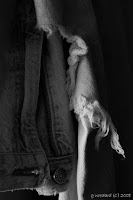

 A couple of days ago I came across a thread on one of the forums about the pros and cons of shooting in camera monochrome images. There is a segment that obviously feels that allowing the camera to do the monochrome conversion as opposed to twittering your time away in Photoshop is pedestrian simplemindedness at best.
A couple of days ago I came across a thread on one of the forums about the pros and cons of shooting in camera monochrome images. There is a segment that obviously feels that allowing the camera to do the monochrome conversion as opposed to twittering your time away in Photoshop is pedestrian simplemindedness at best.The most humorous suggested that he was taught in Nikon School that shooting monochrome in camera produced reduced resolution because monochrome only used one of the three channels. This person apparently had never shot an in camera monochrome and then opened it in a converter that did not recognize the camera setting. Had he, he would realize that the monochrome comes out in full color. Or maybe he thought the two missing channels were extrapolated from the single color channel used by monochrome.

 Most were incensed that anyone would be so foolish. Well, I have never admitted to being anything more than a simple minded fool so I occasionally shoot in camera monochrome. As a matter of fact, that thread stirred the desire to do some monochrome images so for the past couple of days I have been shooting in camera monochromes and I will probably shoot more.
Most were incensed that anyone would be so foolish. Well, I have never admitted to being anything more than a simple minded fool so I occasionally shoot in camera monochrome. As a matter of fact, that thread stirred the desire to do some monochrome images so for the past couple of days I have been shooting in camera monochromes and I will probably shoot more.BTW, opinion, even if you do intend to twiddle away in Photoshop to achieve a monochrome image, I believe that it is advantageous to shoot in camera monochrome so that you see the image as monochrome on the LCD. And like me you may not feel that the results you achieve are all that bad.
I have taught Nikon School for 15 years and I can assure you no instructor has told an audience that shooting in monochrome will reduce resolution, because you are right; it does not.
ReplyDeleteIf you speak to large groups of people you will know that what people hear is sometimes not what was said. The instructor staff makes a serious effort to communicate clearly but people misunderstand things all the time and when struggling with complex material often try to simplify it to make it more manageable. In the process they may interpret what they don't understand in a completely wrong manner.
You are also right in that if you shoot RAW files as monochrome, you will have the color file when opening it in editing software, but be able to preview the image as a gray scale on the LCD. However, if you shoot jpegs, you have lost all the color data and have fewer options in trying to tweak the file later.
What we suggest in the School is not that shooting monochrome is simplemindedness, but that by having the color file and working it with a tool like Channel Mixer, you have more control of adjusting the tonal values, in much the same way someone shooting B & W film would have used red, green, orange and yellow filters to alter contrast and tonal relationships in the shot.
To illustrate how misunderstanding can go in many directions, we had one student at a School insist that shooting in monochrome was better than converting later, because by shooting monochrome all three channels were devoted to gray scale tones and you would get MORE resolution.
Bill Durrence
Bill, thank you for your post. I am pleased to know that Nikon Schools are not so silly. I believe that if you had read carefully, I was talking about the ever popular Internet forums not the Nikon School. Although I do find it interesting that you seem compelled to be so defensive.
ReplyDeleteAnd as far as your recommended Channel Mixer, you are correct that it offers some degree of filter control, however, I would venture that less than twenty percent of the people that use Photoshop can make a monochrome conversion using the Channel Mixer that is superior to an in-camera monochrome. It seems from what I read that is about the percentage that actually learn to use Photoshop.
I am very happy with in-camera and Capture NX.